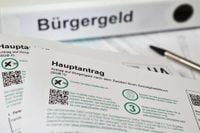As the month of April 2025 approaches, many citizens in Germany are eagerly awaiting their financial assistance, specifically the Arbeitslosengeld and Bürgergeld. These social benefits are crucial for millions who rely on them to cover their living expenses. Understanding the payment schedules for these benefits is essential for recipients, especially as they navigate their financial obligations.
Arbeitslosengeld, or unemployment benefits, is a statutory insurance benefit paid to individuals who have contributed to the unemployment insurance system. It's important to note that Arbeitslosengeld is distinct from Bürgergeld, which is a basic security benefit for job seekers. The key difference lies in the nature of these payments: while Arbeitslosengeld is a retroactive payment based on prior contributions, Bürgergeld is provided upfront.
For those relying on Arbeitslosengeld, the payment for March 2025 is set to be disbursed on Monday, April 1, 2025. This payment is crucial for individuals who are currently unemployed, as it helps them manage their financial responsibilities. In contrast, the payment for April 2025 will not occur until the end of the month, specifically on Wednesday, April 30, 2025. This timing aligns with the standard practice of retroactive payments, where individuals receive benefits after the month has concluded.
As of now, over 7.5 million people in Germany are dependent on Arbeitslosengeld. The delayed payment system can create challenges for recipients who may struggle to meet their expenses in the interim. If the Arbeitslosengeld is insufficient to cover living costs, individuals may also apply for additional support through Wohngeld (housing benefit), Kinderzuschlag (child allowance), or Bürgergeld.
The Wohngeld, a subsidy designed to assist citizens who cannot afford their rent due to low income, has undergone significant reforms beginning in 2023. These changes have expanded eligibility, allowing more citizens to access this vital support. The Wohngeld is typically paid for a duration of twelve months, and recipients must ensure that their applications are submitted on time to avoid delays in payments.
For April 2025, the Wohngeld is scheduled to be deposited into recipients' accounts on Monday, March 31, 2025. This timing is crucial as it ensures that the funds are available before the end of the month, allowing recipients to pay their rent on time. The Wohngeld payments are structured to arrive before the start of each month, reflecting the necessity for timely financial support.
As recipients prepare for the upcoming month, they must also be aware of the Bürgergeld, which is another form of social assistance. According to the Second Book of Social Law (SGB II), Bürgergeld is typically paid in advance, with payments expected to be made by the last working day of the previous month. For April 2025, this means that the Bürgergeld will be transferred no later than Monday, March 31, 2025, ensuring that it is available on the first of the month.
However, the future of Bürgergeld is currently uncertain. Following the recent elections of the German Bundestag in February 2025, there has been discussion about potentially replacing Bürgergeld with a new basic security program. Prominent political figures, such as Friedrich Merz from the CDU, have indicated that they may seek to limit or eliminate benefits for current recipients of Bürgergeld.
For those who rely on Bürgergeld, understanding the payment process is crucial. The local job center is responsible for managing these payments, and recipients should be proactive in ensuring that their personal information is up to date to avoid any disruptions in their benefits. If payments are delayed, individuals are encouraged to first check with their bank and then contact their local job center for assistance.
In summary, the upcoming months will be critical for many individuals and families in Germany as they navigate the complexities of social benefits. With over 7.5 million people relying on Arbeitslosengeld, timely payments are essential to maintaining financial stability. As the Wohngeld and Bürgergeld payments approach, recipients must remain informed about their rights and responsibilities to ensure they receive the support they need.
As the landscape of social assistance evolves, it remains to be seen how changes in policy will impact those who depend on these vital benefits. For now, the focus remains on the timely disbursement of funds, allowing individuals to meet their essential needs and maintain their livelihoods.






